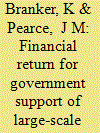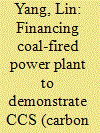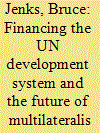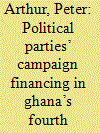|
|
|
Sort Order |
|
|
|
Items / Page
|
|
|
|
|
|
|
| Srl | Item |
| 1 |
ID:
184661


|
|
|
|
|
| Summary/Abstract |
Earmarked funding to international organizations (IO s) has increased significantly over the past two decades. International relations scholars have examined the causes of this trend, but know less about its effects on UN entities. This article identifies different types of earmarked funding, varying from low to high discretion delegated to IO s. Secondly, it examines trends in the UN Development Programme and UN Children’s Fund and finds that both have significant proportions of earmarked funding with low discretion. Drawing on thirty interviews, the article notes four implications of tightly earmarked financing: 1) higher transaction costs for IO s; 2) less predictable funding; 3) overhead costs that are rarely covered; and 4) increasing competition for financing. Overall, the article highlights that earmarked financing exists on a spectrum from tight to minimal control by donor states, and this has important implications for multilateralism.
|
|
|
|
|
|
|
|
|
|
|
|
|
|
|
|
| 2 |
ID:
180868


|
|
|
|
|
| Summary/Abstract |
Increasing variable renewable energy penetration, climate change, and global uncertainties will make it harder to stabilize and balance power systems. This situation will be especially challenging for developing economies with limited capital and institutional capacity, poor infrastructure, and rapid economic growth. Using the Philippines as a case study for a developing economy, the paper identified chronic underinvestment in the supply of ancillary services that play a crucial role in balancing energy supply with demand and building grid resilience. To diagnose the cause, the paper created a novel dataset with all ancillary services revenue contracts in effect at the end of 2019 and analyzed their key terms and conditions. The paper concludes that these contracts are not conducive to financing due to short durations, low and soft buying commitments, exclusive focus on incumbent versus new entrants, hour and season constraints, and a poorly implemented remuneration methodology. The literature rarely analysis this topic from a financing perspective and at this level of detail. Revenue contracts need to switch to long-term, firm, and technology-specific cost recovery mechanisms with new entrants, to incentivize financing. Storage technologies such as batteries and hydropower should be prioritized, followed by gas turbines. These changes will result in a more secure, resilient, and affordable power system.
|
|
|
|
|
|
|
|
|
|
|
|
|
|
|
|
| 3 |
ID:
178435


|
|
|
|
|
| Summary/Abstract |
The number of people aged more than 60 in Bangladesh is projected to constitute 20% of total population by 2051. The demographic momentum makes it necessary to pursue policies that guarantee a secured life for the country’s senior citizens. Currently, more than 40% of old age population (more than 65 years) in Bangladesh do not receive any type of pension or social security benefits. In this backdrop, introduction of a universal pension scheme (UPS) is an idea that should merit serious consideration. The idea of a UPS is also aligned with several Sustainable Development Goals (SDG) targets. Based on the International Labour Organization multi-pillar pension model, the article deals with required financing under different scenarios of introducing UPS in Bangladesh. The study estimates that for introducing a non-contributory UPS in Bangladesh, it would require an additional average allocation equivalent to 0.1%–0.5% of gross domestic product per annum between now and 2040. The article also estimates financing needs considering two options for the contributory UPS. The article concludes that UPS in Bangladesh can be launched on a limited scale which then could be expanded in scope and coverage in a gradual and phased manner. The article also underscores that introduction of UPS will create opportunities to rationalize the existing safety net programmes that will release funds for underwriting the UPS.
|
|
|
|
|
|
|
|
|
|
|
|
|
|
|
|
| 4 |
ID:
168694


|
|
|
|
|
| Summary/Abstract |
This paper aims at shedding some lights on how policy induced uncertainty affects the cost of capital of renewable energy power plants. To this end, the paper focuses on renewable energy auctions and on the ongoing Brexit negotiations. First, the paper reviews auction frameworks across Europe and discusses the impact of the different designs on project risk. Then, a stated preference approach is leveraged to investigate how policy design and the uncertainty regarding the future arrangements between the UK and the EU contribute to determine the cost of equity for renewable energy. The results show that improved auction design can help to lower the equity cost between 0.5% and 1.5%. The evidence on Brexit is rather weak and - if anything - suggests only a higher relevance of these negotiations for English-based investors than for those based in EU27.
|
|
|
|
|
|
|
|
|
|
|
|
|
|
|
|
| 5 |
ID:
160989


|
|
|
|
|
| Summary/Abstract |
The separation between export control and counterproliferation finance (CPF) efforts may be undermining governments’ ability to detect and stop weapons of mass destruction (WMD) proliferation. Using export-control information in screening financial transactions and using financial information in export-control decision making can be mutually reinforcing, each system feeding new information back to the other, creating a fuller picture of proliferation procurement networks. This article begins by identifying the US domestic agencies and international bodies involved in export controls and CPF, respectively, followed by a brief outline of the international and domestic sanctions regimes and export-control implementation. It then examines why financial information has historically not been considered relevant to export control and why export-control information is not regularly used to stop financial crime. The article then discusses the limitations of existing proliferation-finance guidance provided to financial institutions, as well as the problematic exclusion of marine insurance from US anti-money-laundering regulations and how it detracts from counterproliferation efforts. The authors conclude with a series of concrete options for better integrating export-control enforcement and combating proliferation finance, including options for both the US and the international community.
|
|
|
|
|
|
|
|
|
|
|
|
|
|
|
|
| 6 |
ID:
097276


|
|
|
|
|
| Publication |
2010.
|
| Summary/Abstract |
As the Ontario government has recognized that solar photovoltaic (PV) energy conversion is a solution to satisfying energy demands while reducing the adverse anthropogenic impacts on the global environment that compromise social welfare, it has begun to generate policy to support financial incentives for PV. This paper provides a financial analysis for investment in a 1 GW per year turnkey amorphous silicon PV manufacturing plant. The financial benefits for both the provincial and federal governments were quantified for: (i) full construction subsidy, (ii) construction subsidy and sale, (iii) partially subsidize construction, (iv) a publicly owned plant, (v) loan guarantee for construction, and (vi) an income tax holiday. Revenues for the governments are derived from: taxation (personal, corporate, and sales), sales of panels in Ontario, and saved health, environmental and economic costs associated with offsetting coal-fired electricity. Both governments enjoyed positive cash flows from these investments in less than 12 years and in many of the scenarios both governments earned well over 8% on investments from 100 s of millions to $2.4 billion. The results showed that it is in the financial best interest of both the Ontario and Canadian federal governments to implement aggressive fiscal policy to support large-scale PV manufacturing.
|
|
|
|
|
|
|
|
|
|
|
|
|
|
|
|
| 7 |
ID:
076892


|
|
|
|
|
| Publication |
2007.
|
| Summary/Abstract |
Financing alternatives for small and medium enterprises in China are discussed in the present study. In particular, we analyze the significant changes and developments in China s "second board" stock market. China s extensive network of regional assets and equity exchanges, which were set up to facilitate private equity transfer, and non-performing loan transactions seem to partially fill the void for small and medium enterprises, which cannot easily obtain approval for listing on the stock exchanges. Foreign investors can identify investment opportunities in non-listed domestic state-owned and private businesses through these regional assets and equity exchanges. At the same time, foreign stock markets are now attracting the young Chinese enterprises to list their stocks on their exchanges
|
|
|
|
|
|
|
|
|
|
|
|
|
|
|
|
| 8 |
ID:
181433


|
|
|
|
|
| Summary/Abstract |
Traditional policy incentives for carbon capture and storage (CCS) mainly rely on fiscal subsidies, which tend to put an inordinate strain on public finances. This study attempts to explore a non-fiscal incentive policy, granting a time extension (extra electricity quota), to finance early CCS demonstration projects in China. We find that coal-fired power plant (CFPP) operate at a loss even without CCS retrofitting under the current electricity quota (4000 h per year), while it can make profits with CCS retrofitting if extra electricity quotas are provided. Specifically, the electricity quota needs to be roughly 4709–7260 h per year with the CO2 capture level ranging from 0.1 to 1 Mt per year in the demonstration stage. In particular, the levelized cost of electricity (LCOE) of CFPP with a capture level of 1 Mt per year is estimated at 298.8 CNY/MWh if the electricity quota reaches 7000 h per year, which is approximately equal to that of CFPP without CCS retrofitting and extra electricity quota (292.2 CNY/MWh). Thus, the extra electricity quota can be considered as an economically feasible policy incentive, and related results are able to provide useful information for electric power enterprises and government decision-makers.
|
|
|
|
|
|
|
|
|
|
|
|
|
|
|
|
| 9 |
ID:
150699


|
|
|
| 10 |
ID:
170836


|
|
|
|
|
| Summary/Abstract |
Fast economic growth in highly populous regions is triggering enormous needs in power generation, transport, and construction. These regions taken together account for over 60% of global greenhouse gas emissions, with 70% of these emissions emanating from carbon–intensive infrastructure. It is imperative that the development of sustainable infrastructure be accelerated, if we are to avoid the risk of locking–in high–emissions economic development pathways for decades to come.
Unfortunately, scaling up finance for investment in sustainable infrastructure assets has been too slow. It is therefore urgent to establish a new framework to create the right environment for scaling up the development of sustainable infrastructure projects aligned with the Paris Agreement and to mobilize the necessary financing, particularly from the private sector, which is critical to ensure an economy–wide transformation. Based on the work of the One Planet Lab, this essay proposes a holistic framework, which covers the demand side (the generation of bankable projects) as well as the supply side (the provision of financing). Among the essential aspects are encouraging the development of investment–grade assets, embedding sustainability in infrastructure planning, and effective project preparation.
This essay suggests action in two coordinated steps. First, generating the policy frameworks to swiftly channel capital towards sustainable infrastructure. Second, to bring together key stakeholders that will allow the mobilization of finance, including development finance institutions, multilateral and national development banks, private financial institutions, institutional investors, and digital finance innovators.
|
|
|
|
|
|
|
|
|
|
|
|
|
|
|
|
| 11 |
ID:
136052


|
|
|
|
|
| Summary/Abstract |
This article seeks to accomplish four tasks. It explores the historical relationship between the financing instruments that dominated different phases of the evolution of the UN development system and the understanding of the concept of multilateralism. Bearing in mind this historical context, it seeks to analyse the defining characteristics of multilateral finance in the context of the UN, in particular the characteristics that make a financial instrument more or less multilateral. It then explores a number of new financial instruments and their possible impact on the future shape multilateralism takes in the UN system. The article concludes with some thoughts on financing for a new multilateralism. In order to go beyond the core/non-core stalemate, it is necessary to develop a new variable geometry based on function, which brings into play assessed, negotiated pledges, voluntary core and non-core instruments.
|
|
|
|
|
|
|
|
|
|
|
|
|
|
|
|
| 12 |
ID:
142733


|
|
|
|
|
| Summary/Abstract |
Using individual-level data from the 2008 European Social Survey and country-level health care financing data we analyze the influence of private financing of health care on political trust in twenty-five European countries. Net of known predictors of trust at the individual and country level, we find that trust in government is significantly lower where the health system is financed to a greater degree by private sources. This negative relationship occurs because in countries with more private financing, low-income citizens perceive themselves to be at greater risk for not receiving needed health care. This perception of risk is associated with more negative evaluations of the performance of the health care system, which in turn is associated with less trust in government. When states do less to ensure the basic health care needs of members of society who are at greatest risk, these citizens may come to place less trust in government institutions. Hence, the increasing pressure on European governments to privatize the financing of health care in the wake of the financial crisis that is also characterized by growing income inequality threatens to make citizens trust government less. At the same time, implementation of the Affordable Care Act could signal a renaissance for political trust in the United States, if a growing role in the health care system is accompanied by a redistribution of risk.
|
|
|
|
|
|
|
|
|
|
|
|
|
|
|
|
| 13 |
ID:
167389


|
|
|
|
|
| Summary/Abstract |
Uncertainties about the amount of resources needed to combat climate change, dwindling local resources, limited local autonomy and limited expertise constrain local governments (LGs) in their response to the effects of climate change. As a result, financing climate change remains a major nightmare for LG actors across diverse nested territorial containers. It certainly requires the embracing of a multifaceted approach – the use of system thinking where local governments’ resource husbandry is optimised to support external aid and central government transfer. A multifaceted approach brings onboard blended resources, diverse stakeholders, diverse resource mobilisation skills and schemes, and accountability measures. Also, given projected increases in future climate-induced public expenditure, albeit with uncertainties, reliance on a single resource mobilisation approach will be a recipe for inefficiency. This article argues that developmental aid and central government’s transfer remains inadequate to meet the increasing demand for adaptation cost at the local level in Ghana. In the face of the unequivocal impact of climate change risk, we contend that local resource husbandry must be optimised through different innovations to complement other major sources of financing. Our contention resonates with the school of thought that argues local level resources are more resilient to politicisation, are stable, and are predictable compared to international aid and central government transfer. Through qualitative in-depth interviews, empirical data has been drawn from local governments in Ghana to justify our claims.
|
|
|
|
|
|
|
|
|
|
|
|
|
|
|
|
| 14 |
ID:
176706


|
|
|
|
|
| Summary/Abstract |
As India implements its Nationally Determined Contributions (NDC), via an ambitious renewable energy target of 175 GW of renewable energy by 2022, it is faced with an opportunity to further reduce greenhouse gas emissions. This opportunity is provided by the average cost of solar (and wind) energy falling below the variable cost of generating power from many existing coal plants. This indicates that, while other potential uses exist (e.g., making coal plants flexible), such expensive brownfield coal plants could potentially be economically retired today by simply switching to buying power from new solar plants. For example, by switching to a solar plant from a sample 5-year coal plant, the savings can be 33.90% in net present value terms. Further, while the savings on energy procurement is obvious, there could also be savings on committed contractual obligations on paying fixed costs, via a process called securitization. For example, using cashflow analysis, we show that retiring a sample 5-year old coal plant can save an additional 31.57% in value. We also discuss plausible regulatory changes, for which there are precedents in India and elsewhere, that would enable this cost-effective transition to a deeper penetration of renewable energy via retirement of expensive coal plants.
|
|
|
|
|
|
|
|
|
|
|
|
|
|
|
|
| 15 |
ID:
159380


|
|
|
|
|
| Summary/Abstract |
While terrorist and insurgent groups have often combined anti-state subversion with ‘purely‘ criminal activities in order to obtain the financial means to wage their ideological struggle, little is known about the transformation of such groups into non-ideological organised crime groups (OCG) with close links to authorities. This holds particularly for jihadist groups that have on ideological grounds ruled out collaboration with their archenemies – ‘infidels’ and ‘apostates’. Using unique ethnographic data from Russia’s Dagestan, this article explores the causes and contexts of the gradual transformation of some of Dagestan’s jihadist units – jamaats – into organised crime groups collaborating with local authorities.
|
|
|
|
|
|
|
|
|
|
|
|
|
|
|
|
| 16 |
ID:
105841


|
|
|
| 17 |
ID:
147620


|
|
|
|
|
| Summary/Abstract |
This paper provides insights on the sustainability of economic development from a historical and political economy perspective. We demonstrate that China's rural financial policy in the 1980s was quite liberal in employing market mechanisms, supporting entrepreneurship, and encouraging competition. These policies were abandoned in the early 1990s and replaced by ubiquitous government interferences that shifted resource and policy priorities to benefit political incumbents. A large panel of survey data confirms that rural household access to finance decreased dramatically in the 1990s and that the statistical significance of economic entrepreneurial factors in determining credit allocation also fell. Further empirical analyses show that market economic conditions are not sufficient to explain these changes and the evidence is consistent with a political entrenchment motive during the political regime after the turmoil in the year 1989. Given the connection between entrenchment and underdevelopment, our findings raise the concern that China's political institutions' insufficient limits on the government could be a challenge for China to sustain its economic success.
|
|
|
|
|
|
|
|
|
|
|
|
|
|
|
|
| 18 |
ID:
157192


|
|
|
|
|
| Summary/Abstract |
The period from 1992 saw Ghana, under pressure from both internal and external sources, embark on the transition to democratic rule. Despite the strides, an issue that has the potential to undermine Ghana’s liberal democratic credentials has centred on the process of political party financing. The purpose of this paper is to analyse how the existing political party financing system in Ghana is negatively impacting on electoral competition and the country’s democratic process. Drawing on secondary sources, this paper shows that, given that it is political resources that drive party vibrancy and competitiveness, a level playing field in terms of public financing of political parties can help in electoral competition and the promotion of the democratic process in Ghana. However, the importance of transparency and accountability, as well as a legal framework that monitors, denounces, sanctions and punishes abuse in the use of public funds, would be crucial if success is to be attained.
|
|
|
|
|
|
|
|
|
|
|
|
|
|
|
|
| 19 |
ID:
099277


|
|
|
|
|
| Publication |
2010.
|
| Summary/Abstract |
This article evaluates the first year of the Section 1603 Treasury cash grant program, which enables renewable power projects in the US to elect cash grants in lieu of the federal tax credits that are otherwise available. To date, the program has been heavily subscribed, particularly by wind power projects, which had received 86% of the nearly $2.6 billion in grants that had been disbursed as of March 1, 2010. As of that date, 6.2 GW of the 10 GW of new wind capacity installed in the US in 2009 had applied for grants in lieu of production tax credits. Roughly 2.4 GW of this wind capacity may not have otherwise been built in 2009 in the absence of the grant program; this 2.4 GW may have supported approximately 51,600 short-term full-time-equivalent (FTE) gross job-years in the US during the construction phase of these wind projects, and 3860 long-term FTE gross jobs during the operational phase. The program's popularity stems from the significant economic value that it provides to renewable power projects, relative to the otherwise available tax credits. Although grants reward investment rather than efficient performance, this evaluation finds no evidence at this time of either widespread "gold-plating" or performance problems.
|
|
|
|
|
|
|
|
|
|
|
|
|
|
|
|
| 20 |
ID:
120031


|
|
|
|
|
|
|
|